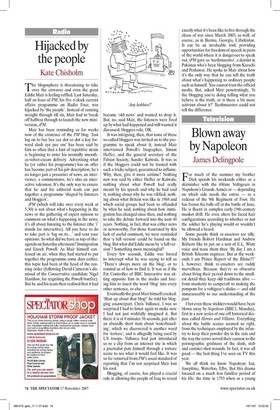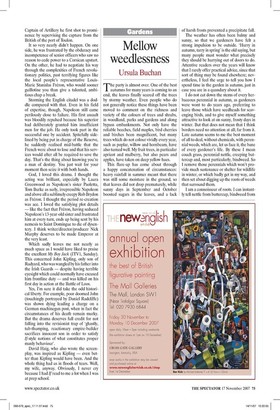Blown away by Napoleon
James Delingpole For much of the summer my brother Dick spends his weekends either as a skirmisher with the 69eme Voltigeurs in Napoleon's Grande Armee or — depending on which side needs the extras — as a redcoat of the 9th Regiment of Foot. He has frozen his balls off at the battle of Jena. He is fluent in complex early-19th-century musket drill. He even alters his facial hair configurations according to whether or not the soldier he's playing would or wouldn't be allowed a beard.
Some people think re-enactors are silly. My friends Robert Hardman and Andrew Roberts like to put on a sort of E.L. Wisty voice and tease them thus: 'By day I am a British Telecom engineer. But at the weekends I am Prince Rupert of the Rhine!!!' I, however, think re-enactors are ruddy marvellous. Because they're so obsessive about living their period down to the smallest detail they keep old traditions alive — from musketry to camperaft to making the pompom for a voltigeur's shako — and add immeasurably to our understanding of the past.
I bet even these sticklers would have been blown away by Napoleon (BBC1, Monday), first in a new series of one-off historical dramas called Heroes and Villains. Everything about the battle scenes seemed so right, from the techniques employed by the infantry to keep their powder dry in the rain and the way the crews served their cannon to the pornographic grisliness of the slash, stab and canister-shot wounds. In fact, it was all good — the best thing I've seen on TV this year.
We all think we know Napoleon: hat, Josephine, Waterloo, Elba. But this drama focused on a much less familiar period of his life: the time in 1793 when as a young Captain of Artillery he first shot to prominence by supervising the capture from the British of the port of Toulon.
It so very nearly didn't happen. On one side, he was frustrated by the obduracy and incompetence of senior officers who saw no reason to cede power to a Corsican upstart. On the other, he had to negotiate his way through the complexities of French revolutionary politics, past terrifying figures like the local people's representative LouisMarie Stanislas Freron, who would sooner guillotine you than give a talented, ambitious chap a break.
Storming the English citadel was a doddle compared with that. Even in his field of expertise, though, Napoleon still came perilously close to failure. His first assault was bloodily repulsed because his superior had deliberately granted him insufficient men for the job. He only took part in the successful one by accident. Spitefully sidelined by being put in charge of the Reserve, he suddenly realised mid-battle that the French were about to lose and that his services would after all be required to save the day. That's the thing about knowing you're a man of destiny. You just wait for your moment then seize it with both hands.
God, I loved this drama. I thought the acting was brilliant, especially by Laura Greenwood as Napoleon's sister Paoletta, Tom Burke as surly, irrepressible Napoleon and above all a sublimely creepy Rob Brydon as Freron. I thought the period re-creation was ace. I loved the satisfying plot details — like the fact that Freron, having seduced Napoleon's 13-year-old sister and frustrated him at every turn, ends up being sent by his nemesis to Saint Domingue to die of dysentery. I think writer/director/producer Nick Murphy deserves to be made Emperor at the very least.
Which sadly leaves me not nearly as much space as I would have liked to praise the excellent My Boy Jack (ITV1, Sunday). This concerned John Kipling, only son of Rudyard, who was wangled by his father into the Irish Guards — despite having terrible eyesight which could normally have excused him frontline duty — and was killed on his first day in action at the Battle of Loos.
Yes, I'm sure it did take the odd historical liberty. For example, poor doomed John (touchingly portrayed by Daniel Radcliffe) was shown dying leading a charge on a German machinegun post, when in fact the circumstances of his death remain murky. But the drama deserves full credit for not falling into the revisionist trap of 'ghastly, tub-thumping, reactionary empire-builder sacrifices innocent son in order to satisfy /f-style notions of what constitutes proper manly behaviour'.
David Haig, who also wrote the screenplay, was inspired as Kipling — even better than Kipling would have been. And the whole thing had us in floods of tears. Well, my wife, anyway. Obviously, I never cry because I had If read to me a lot when I was at prep school.





































































 Previous page
Previous page